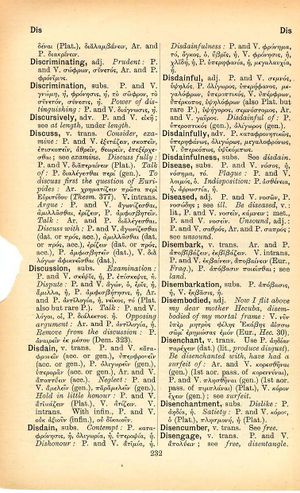disdain: Difference between revisions
From LSJ
Εὐχῆς δικαίας οὐκ ἀνήκοος θεός → Numquam deus surdescit ad iustas preces → Der angemessnen Bitte öffnet Gott sein Ohr
(CSV3) |
mNo edit summary |
||
| Line 15: | Line 15: | ||
<b class="b2">Dishonour</b>: P. and V. [[ἀτιμία]], ἡ. | <b class="b2">Dishonour</b>: P. and V. [[ἀτιμία]], ἡ. | ||
<b class="b2">disdainfulness</b>: P. and V. [[φρόνημα]]", τό, [[ὄγκος]], ὁ, [[ὕβρις]], ἡ. V. [[φρόνησις]], ἡ, [[χλιδή]], ἡ, P. [[ὑπερηφανία]], ἡ, [[μεγαλαυχία]], ἡ. | |||
}} | }} | ||
Revision as of 09:30, 21 July 2017
English > Greek (Woodhouse)
v. trans.
P. and V. καταφρονεῖν (acc. or gen.), ὑπερφρονεῖν (acc. or gen.), P. ὀλιγωρεῖν (gen.), ὑπερορᾶν (acc. or gen.), Ar. and V. ἀποπτύειν (acc.).
Neglect: P. and V. ἀμελεῖν (gen.), παραμελεῖν (gen.).
Hold in little honour: P. and V. ἀτιμάζειν (Plat.), V. ἀτίζειν.
V. intrans. With infin., P. and V. οὐκ ἀξιοῦν (infin.), οὐ δικαιοῦν.
subs.
Contempt: P. καταφρόνησις, ἡ, ὀλιγωρία, ἡ, ὑπεροψία, ἡ.
Dishonour: P. and V. ἀτιμία, ἡ.
disdainfulness: P. and V. φρόνημα", τό, ὄγκος, ὁ, ὕβρις, ἡ. V. φρόνησις, ἡ, χλιδή, ἡ, P. ὑπερηφανία, ἡ, μεγαλαυχία, ἡ.

